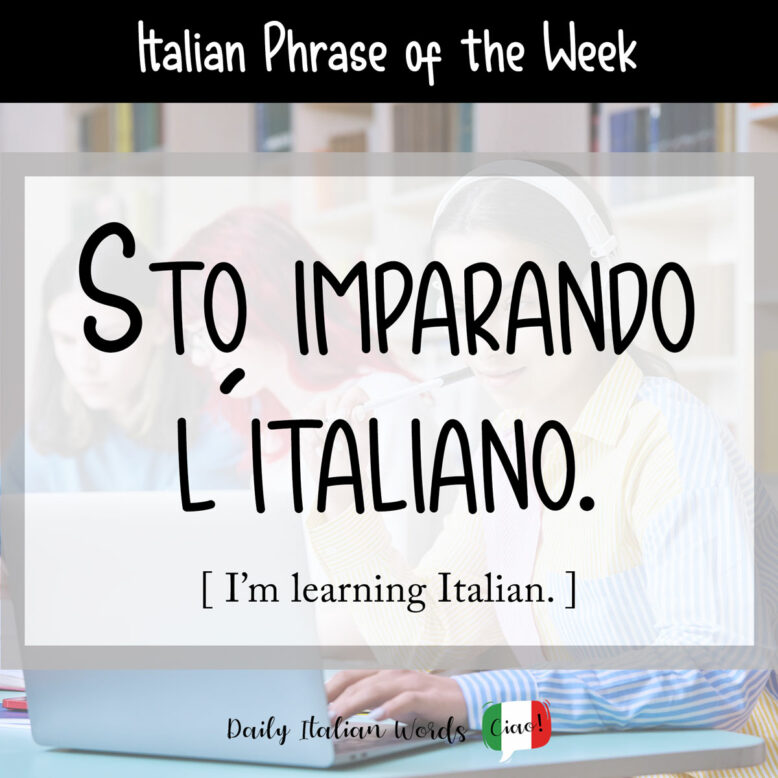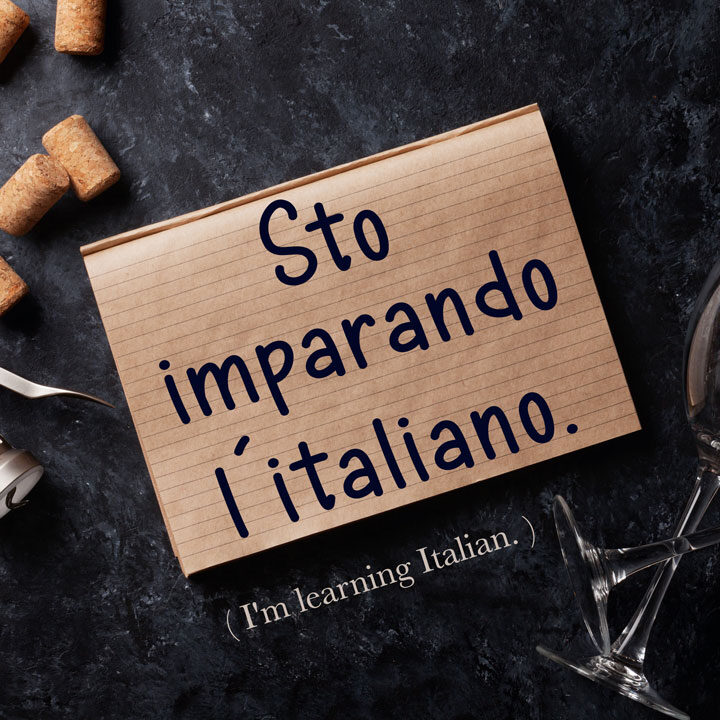If you are an English speaker living in Italy, it is important to let people know that you are currently learning the Italian language. Otherwise, some people, however well-intentioned they may be, might assume that you’d rather speak in English or try to practise their English on you.

The best way to translate the phrase I’m learning Italian is:
(Io) sto imparando l’italiano.
I’m learning Italian.
Let’s take a look at how this phrase breaks down:
io
The personal pronoun io is the equivalent of I in Italian. Person pronouns can often be omitted, which is why we placed it in brackets above.
sto imparando
Sto imparando means am learning in Italian.
It is formed from the first person present tense of stare (to be / to stay) followed by the gerund, which is a verb form ending in –ando or –endo. It is used to make continuous tenses, like -ing in English.
l’italiano
L’italiano literally translates as the Italian. The definite article (il / l’ / lo) is required whenever the verb imparare (to learn) is followed by the name of a language. For example:
– imparare l’inglese = to learn English
– imparare il tedesco = to learn German
– imparare lo spagnolo = to learn Spanish
Also note that language names like italiano are not capitalised in Italian.

Another verb you can use in the place of imparare is studiare (to study):
(Io) sto studiando l’italiano.
I’m studying Italian.
Imparare vs Studiare
It is important to highlight that unlike English, imparare and studiare are not always completely interchangeable. This isn’t easy to explain, but I’ll try to make it as simple as possible with a few examples.
In English, you can say:
- I’ve been learning Italian for 10 years.
- I’ve been studying Italian for 10 years.
Both versions are widely accepted and sound correct. The general meaning they convey is similar, even though the precise definitions of to study and to learn are not exactly the same.
Now let’s see the Italian version of these two sentences:
- Imparo l’italiano da dieci anni.
- Studio l’italiano da dieci anni.
The first sentence is not grammatically incorrect, but it doesn’t sound as natural as the second sentence in Italian. Why is that? Well, first of all, let’s see what the differences are between these two verbs.
Studiare implies that you’re attempting to acquire knowledge (by attending classes, reading books, etc.) whereas imparare is the acquisition of that knowledge as a result of studying.
Imparare tends to indicate the moment in which that knowledge was acquired, whereas the verb studiare suggests a period of time.
In our example, the conflict is caused by the time frame of 10 years. After such a long period of time, one would expect the acquisition of Italian to be complete or well-developed (meaning that you can speak and write it), not that it is still ongoing. This is why the verb imparare would work better with the Passato Prossimo tense:
- Ho imparato l’italiano in dieci anni. = I learned Italian in ten years.
If you haven’t finished learning Italian, then the studiare version seen earlier (Studio l’italiano da dieci anni) sounds better.
If you want to gain a better understanding of these two verbs, let’s take our example phrase and transform it into a mini story.
- Voglio imparare / studiare l’italiano (I want to learn / to study Italian)
This marks the moment when you decide to begin your journey. Both imparare and studiare work because it is your intention that counts, highlighted by the verb volere (to want). - Ho cominciato a studiare l’italiano (I’ve started to learn Italian)
Your journey toward acquiring the Italian language has begun. You might have acquired knowledge of a few words already, but you’re a long way from speaking and writing. - Sto imparando l’italiano (I’m learning Italian)
I’m at a phase now where I’m starting to acquire some knowledge about it, some knowledge I can even use, but there is still more to learn to become fluent. Sto studiando l’italiano more or less implies the same thing. Perhaps the biggest difference is that the studiare version doesn’t actually give confirmation that I’ve learned something – that is, you can study something for years without actually learning anything! - Ho già imparato tanto ma voglio imparare di più. Studierò per altri tre anni. (I have learned a lot already, but I want to learn more. I’ll study for three more years.)
My knowledge is good now, I can speak and write, follow conversations and order a focaccia at the bakery, but I crave more knowledge and want to study more. - Ho imparato l’italiano dopo dieci anni, finalmente! (I learned Italian in 10 years, finally!)
This marks the moment in which my studies have finished. I am fluent in the language and I can prepare for my lifelong dream of living in the country. Hurray!
We have a happy ending. But if we want to be mean and give this 10 year journey a sad ending, I could say:
Ho studiato l’Italiano per dieci anni e non ho imparato niente!
I studied Italian for ten years, and I didn’t learn a thing!
To summarise, I think the best way for learners to understand when to use one verb or the other is to think about the time frame you want to describe. There will be grey areas (as is often the case with languages), but the verb tense and the context can help.
And don’t forget: non si smette mai di imparare nella vita (we never stop learning in life)!

Heather Broster is a graduate with honours in linguistics from the University of Western Ontario. She is an aspiring polyglot, proficient in English and Italian, as well as Japanese, Welsh, and French to varying degrees of fluency. Originally from Toronto, Heather has resided in various countries, notably Italy for a period of six years. Her primary focus lies in the fields of language acquisition, education, and bilingual instruction.


